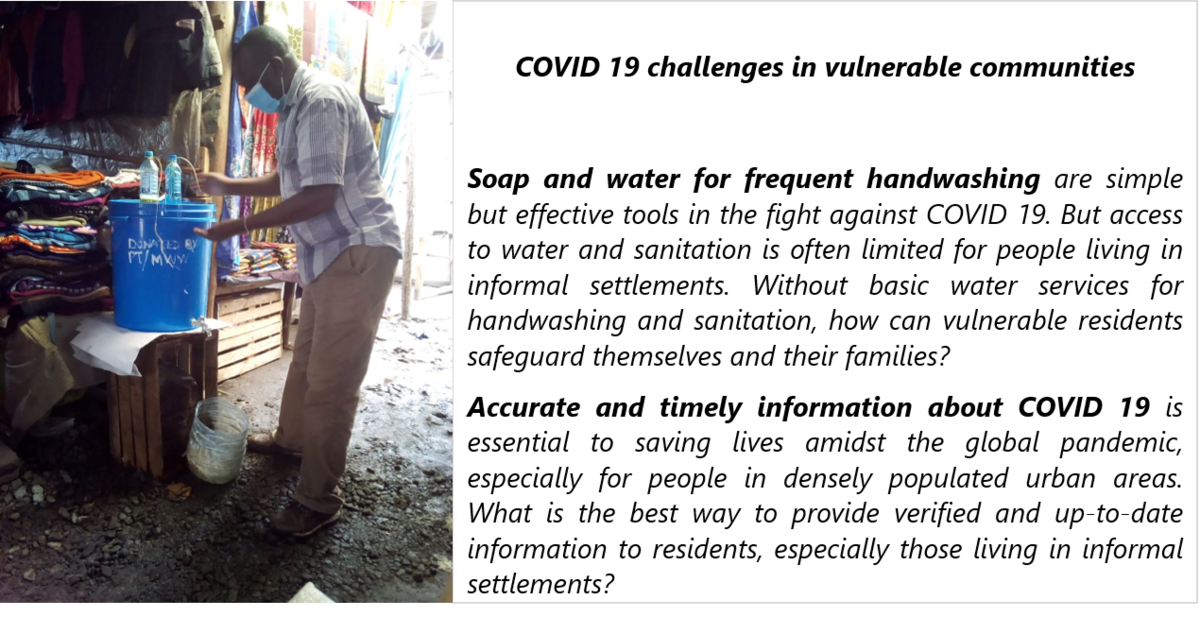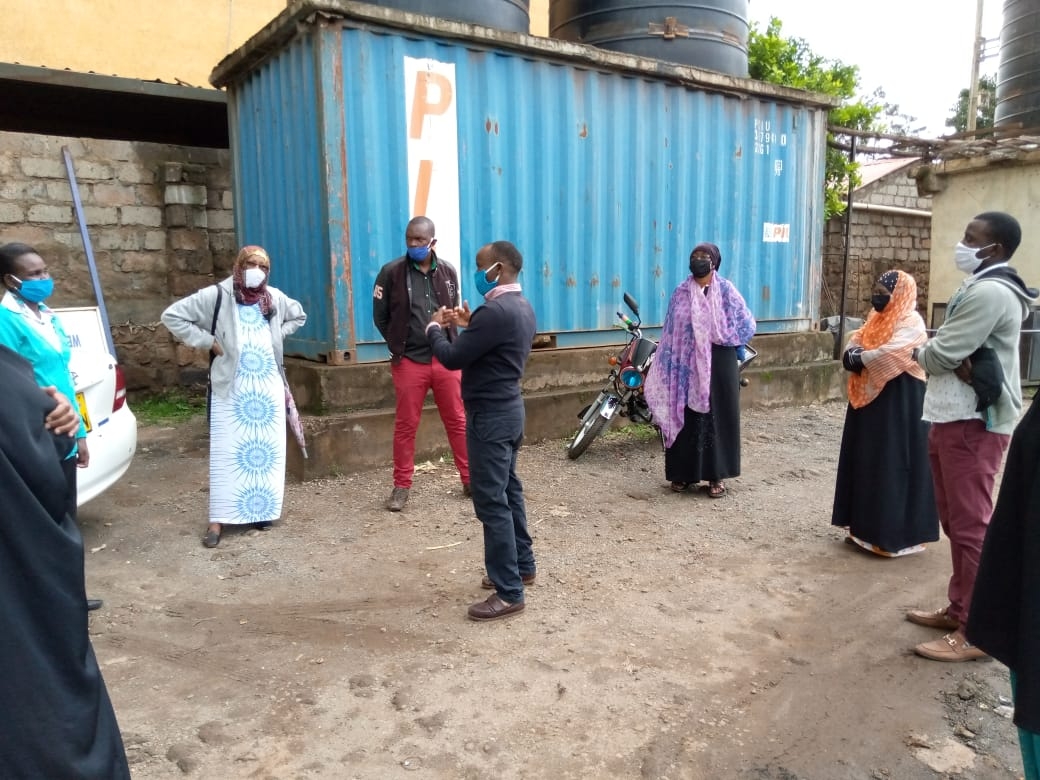The opinions expressed herein are solely those of the author(s) and do not necessarily reflect the official views of Cities Alliance or its members
Blog authored by Sam Olando, Executive Director, Pamoja Trust*
The outbreak of the novel coronavirus (SARS-CoV-2) worldwide has highlighted the vulnerabilities of people in informal settlements, particularly in the Global South. Disparities in the availability of basic water and sanitation services among urban populations, as well as in the dissemination of crucial information about the pandemic can profoundly affect not only wellness management, but the critical measures necessary to combat COVID 19.
In response to this urgent situation, Pamoja Trust, a civil-society organization based in Kenya, is facilitating the flow of both water and information to residents of informal settlements in Nairobi and Mombasa.

WASH solutions in informal settlements
One of the dangers in addressing the effects of COVID 19 in informal settlements has been the commercialization of access to basic services. Pamoja Trust has therefore engaged with water service providers across 10 counties in developing approaches to ensure that water is treated as a right and that the provision of water services to settlements is not commercialized.
Pamoja Trust has also partnered with the Nairobi Water and Sanitation Company (NAWASCO), to install water tanks in various settlements, such as Korogocho, Kibra, Dagoretti, and Kangemi, to actualize the WASH protocols developed by the Ministry of Water, Sanitation and Irrigation. To this end Pamoja Trust intends to ensure that the installed water tanks are connected to main water trunks for the steady supply of water to people in informal settlements.
Similar partnerships have been sought with Mombasa Water Company and water experts. Preliminary discussions have also been held with the County Government of Mombasa to entrench Delegated management model (DMM) toward sustainable water supply in the informal settlements.
Pamoja Trust has also partnered with the Council of Governors (CoG) to develop guidelines that view the provision of water services as a right and guard against commercialization tendencies. This has been further entrenched in the monitoring framework developed jointly with the CoG and the Ministry of Water, Sanitation and Irrigation. Significantly, a recent communique from the Ministry of Water, Sanitation and Irrigation to the CoG outlines protocols and guidelines for water supply and the provision of sanitation services. Included is the specification that water be supplied to informal settlement free of charge for three months.
Disseminating information on COVID 19

Access to verified and accurate information regarding COVID 19 is essential for all citizens, including residents of informal settlements, and particularly about policies implemented in response to the pandemic. Pamoja Trust has thus partnered with community leadership, CBOs, and social movements to strengthen access to online information through platforms such as WhatsApp and Google Groups. These efforts are also being made to help strengthen and entrench the inherent right to information as an inalienable right, especially in crises such as the COVID 19 pandemic.
Among the documents developed, reviewed, and responded to through these platforms is the Tax Laws Amendment Bill of 2020. The components canvassed included Tax Measures on COVID 19 by the National Government, Public Participation, and Impact of COVID 19 on the Kenya’s Budget Cycle. Specific elements canvassed were the duration and estimated cost of tax expenditures, their distribution based on demographics relevant to COVID 19, and access to basic services by people in informal settlements.
Further submissions have been made to Parliament, particularly by the senate to the Senate Ad Hoc Committee on the COVID-19 Situation in Kenya. These elements have been captured in the progress reports of the Senate Ad Hoc Committee, particularly on pages 24 and 39 of the 2nd Progress Report (April 14th . The proposition of Pamoja Trust, its partner organizations and social movements on ; prohibition of forced evictions during the pandemic period, the need to have a comprehensive database on the informal settlements as well as the mapping of vulnerable groups which would be necessary in prioritization of needs is outlined in the report. These are attributes that Pamoja Trust and Cities Alliance are seeking to address in the advocacy for the uptake of STDM as a flexible pro-poor land information and management tool.
Going forward: Human rights-centered approaches to essential services
The consequences of misgovernance and the exclusionary nature of government policies and practices toward poor people have been manifested in the impacts of the global pandemic on vulnerable populations. Nevertheless, the COVID 19 outbreak also presents an opportunity for nations to interrogate historically marginalizing policies that have affected people in low-income areas.
Approaches should thus be developed that go beyond temporary measures for addressing pandemics and toward the adoption of a human right-centered approach to essential services, including water and the access to information.
Pamoja Trust and its partners such as Cities Alliance understand the importance of community engagement and the nexus that exists therein with people in informal settlements. The Trust has thus continued to work with settlements’ executive committees, community based organizations (CBOs), and social movements towards control of the COVID 19 pandemic, with the understanding that such groups are more familiar with the complexities of these spaces and have been set up over time to respond to such events locally.
*About the author:
Sam Olando is the Executive Director of Pamoja Trust, a civil-society organization based in Kenya that has made use of the Social Tenure Domain Model (STDM), a flexible pro-poor land tool, to define context-specific modes of understanding informal tenure relations and claims. Pamoja Trust, with support from Cities Alliance, has engaged communities and governments on the uptake of the tool so as to give urban informal communities the chance to move towards tenure regularization and better access to social and economic services. This collaboration with Cities Alliance seeks to secure lessons, experiences and partnerships and use them to gain new ground in implementation of STDM for inclusive sustainable cities.





